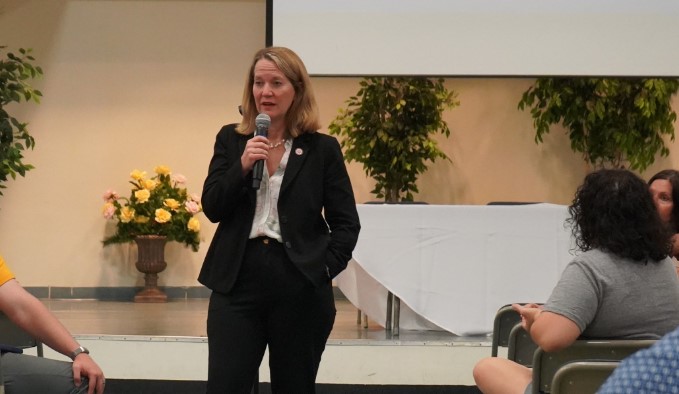
by Corinne Murdock | Dec 10, 2023 | News
By Corinne Murdock |
The Maricopa County Republican Committee (MCRC) called on the Arizona House to bring impeachment charges against Attorney General Kris Mayes.
In a resolution approved on Tuesday, MCRC accused Mayes of abuse of office and violation of constitutional oaths by prosecuting Cochise County Supervisors Peggy Judd and Tom Crosby. The committee’s resolution likened Mayes’ actions to those that occur under dictatorships or communist rule.
“Kris Mayes is using her prosecutorial powers as the Arizona Attorney General to interfere with the County Board of Supervisors’ responsibility and authority to ensure the Peoples’ right to a secure election that is accurate and free from abuse or manipulation,” stated the resolution. “Kris Mayes’ prosecution of Cochise County Supervisors Peggy Judd and Tom Crosby is an act of political prosecution common in dictatorships or communist countries.”
State Sen. Wendy Rogers (R-LD07) applauded the move and echoed the call to action.
Last week, Mayes announced felony charges of interference with an election officer and conspiracy against Judd and Crosby. Together, the charges carry a punishment of up to five years’ imprisonment and fines of up to $300,000.
“The repeated attempts to undermine our democracy are unacceptable,” said Mayes. “I took an oath to uphold the rule of law, and my office will continue to enforce Arizona’s elections laws and support our election officials as they carry out the duties and responsibilities of their offices.”
Gov. Katie Hobbs announced her approval of the charges, echoing Mayes’ sentiment that Judd and Crosby had undermined democracy.
“To give Arizonans the free & fair elections they deserve, we must hold those who seek to undermine our democracy accountable,” said Hobbs.
In Tuesday’s resolution, MCRC defended Judd and Crosby as having the lawful authority to take the time they needed beyond the certification deadline to canvass the 2022 election. MCRC cited the widespread voting tabulation equipment malfunctions in Maricopa and Pinal counties, as well as the imbalance in the Pinal County canvass report, as justification for Judd and Crosby’s delayed certification.
MCRC accused Mayes of prosecuting Judd and Crosby as a means of intimidating other local elected officials from doing their due diligence to ensure the security and fairness of elections.
The MCRC executive board consists of Craig Berland, Shelby Busch, Tatiana Pena, Lawrence Hudson, Dan Grimm, Jeff Greenspan, Joanie Colson, Joe Neglia, former lawmaker Liz Harris, and Brian Ference.
Corinne Murdock is a reporter for AZ Free News. Follow her latest on Twitter, or email tips to corinne@azfreenews.com.

by Corinne Murdock | Dec 9, 2023 | News
By Corinne Murdock |
Gov. Katie Hobbs has reversed course on her decision to send the National Guard to the border.
On Friday, Hobbs announced the plans to deploy the National Guard through Operation Safety, Enforcement, Coordination, & Uniform Response (SECURE): a new mobilization effort of additional state resources to mitigate the burgeoning border crisis. Operation SECURE will house a new Department of Homeland Security division, the Border Security Office, using $2 million from the state’s American Rescue Plan Act (ARPA) federal funding.
Should the Biden administration continue the closure of the Lukeville Port of Entry, the governor directed the state to spend up to $5 million to mobilize the National Guard. In the corresponding press release, Hobbs criticized the Biden administration’s closure of the port of entry as the direct cause of “an unmitigated crisis” that endangered the state’s communities and commerce.
Hobbs warned that the Biden administration has placed Arizona at a “breaking point.”
“Our ports of entry are vital for security and trade, and insufficient resources hinder our ability to properly manage the influx of migrants who have continued to come to Lukeville,” said Hobbs. “We need the federal government to step up, do its job, and bring security and order to our border.”
Hobbs also submitted a letter to President Joe Biden on Friday requesting the reassignment of just over 200 Tucson Sector National Guard members to the Lukeville Port of Entry as well as the assignment of National Guard members elsewhere in the nation to reopen the port of entry.
“For far too long, Arizona has continued to bear the burden of federal inaction in managing our southern border,” said Hobbs.
Hobbs also requested the reimbursement of the over $512.5 million the state has spent under Biden on migrant transportation, drug interdiction, and law enforcement. In her press release announcing Operation SECURE, Hobbs promised to seek reimbursements of border crisis mitigation on a regular basis.
“The federal government must act immediately to solve the unmitigated crisis caused by the Lukeville Port of Entry closure,” said Hobbs.
The governor also disclosed to reporters earlier this week that she would visit the area on Saturday to assess the situation. Hobbs is scheduled to travel with Arizona National Guard Adjutant General Kerry Muehlenbeck.
Hobbs’ decision to deploy the National Guard marks a turnaround from her perspective on Monday, when she felt that the troops weren’t warranted since the border communities hadn’t asked for them.
Customs and Border Protection (CBP) announced the closure of the Lukeville Port of Entry last Friday. CBP attributed the closure to the need for more personnel due to the ever-worsening state of the border crisis.
“In response to increased levels of migrant encounters at the Southwest Border, fueled by smugglers peddling disinformation to prey on vulnerable individuals, CBP is surging all available resources to expeditiously and safely process migrants,” said CBP.
Scenes from the border reveal that around 1,000 illegal immigrants on any given day — mostly single, military-age men — await alongside the border for processing and transportation after illegally crossing into the U.S.
CORRECTION: A previous version of this story incorrectly referred to CBP as Customs and Border Patrol. The story has been corrected and now refers to CBP as Customs and Border Protection.
Corinne Murdock is a reporter for AZ Free News. Follow her latest on Twitter, or email tips to corinne@azfreenews.com.

by Corinne Murdock | Dec 9, 2023 | Education, News
By Corinne Murdock |
The University of Arizona (UArizona) reinstated two professors last week after they were suspended for defending Hamas to their students.
In audio clips published by Israel War Room last month, College of Education professors Rebecca Lopez and Rebecca Zapien made a number of refutable claims about Hamas in explaining the conflict to their students. Zapien ran an unsuccessful campaign to join the Tucson Unified School District last year.
The professors’ comments included the claim that Hamas isn’t a terrorist organization, but rather a resistance group comparable to the Black Panther Party. The U.S. has recognized Hamas as a foreign terrorist organization for well over 20 years. The FBI designated the Black Panther Party as a domestic extremist organization noted for employing violent and guerilla tactics in their attempts to overthrow the government.
The audio clips didn’t distinguish which professor issued the remarks, which occurred in the “Cultural Pluralism For Young Children” class.
One of the professors indicated that she would have engaged in actions similar to those undertaken by Hamas against Israel, in response to what she described as mistreatment of the Palestinians by the Israeli government.
“Hamas is a group within Palestine, they’re a group of people who are responding to that thing that’s going on, so they’re responding, much like I would, enough, they’re not the same, I wanna separate, but for me, I can understand things in a U.S. context, and then it helps me understand them in other countries,” stated one professor.
The professor went on to claim that Hamas doesn’t represent the Palestinian people and aren’t elected officials. The terrorist organization has been the de facto governing body for the area since the early 2000s.
One of the professors also claimed that Israeli forces were targeting civilians, and that Hamas wasn’t antisemitic but anti-Zionist.
The Israel War Room called on UArizona President Robert Robbins to address the professors’ speech.
“[President Robbins], your professors are gaslighting Jewish students, endorsing terrorism, and spreading blatantly false information. We DEMAND you do something about it,” said the Israel War Room.
Leadership did take action — Lopez and Zapien were suspended while the university reviewed the remarks. The pair’s suspension didn’t bode well for students and local groups. The United Campus Workers Arizona launched a petition for their reinstatement and organized multiple sit-ins at the College of Education administration building.
In a statement announcing Lopez and Zapien’s return to the classroom last week, College of Education Dean Robert Berry said UArizona was committed to an inclusive respect of all viewpoints.
“We reaffirm our commitment to an academic instructional setting that respects all viewpoints and is within the scope and educational purposes of our discipline in terms of materials provided in the classroom,” said Berry.
Berry also announced a new faculty-led workshop series, “Educational Dialogues,” to review potentially contentious topics. The first in the series was scheduled for last Friday.
Corinne Murdock is a reporter for AZ Free News. Follow her latest on Twitter, or email tips to corinne@azfreenews.com.

by Daniel Stefanski | Dec 8, 2023 | News
By Daniel Stefanski |
Arizona Legislative Republicans have joined the crescendo of voices pushing back against an impending consent decree from the federal government.
This week, Arizona State Representative David Marshall and 20 of his colleagues in the chamber sent a letter to City of Phoenix Mayor Kate Gallego and members of the council, asking them to “swiftly reject any consent decree proposed by the DOJ and challenge the findings in the forthcoming DOJ report.”
The coalition of lawmakers warned that “the DOJ has used consent decrees to remove local control from police departments in metropolitan cities across the United States,” and that “relinquishing local control of these critical agencies to the federal government has been disastrous for both the public safety of the residents in those cities and for taxpayers.” They pointed to the experience of the state’s largest county, Maricopa, writing, “Arizonans have already suffered the drastic consequences of the DOJ consent decree over the Maricopa County Sheriff’s Department for the past decade.”
In their letter to City of Phoenix officials, the lawmakers also appealed to both the U.S. and Arizona Constitutions about how an enacted consent decree would violate both documents. The legislators stated, “The Arizona Constitution prohibits the state and its political subdivisions from ‘using any personnel or financial resources to enforce, administer or cooperate’ with any federal action or program that does not protect the checks and balances of the United States Constitution… To preserve Arizona’s sovereignty consistent with our state constitution, you must reject the DOJ’s coercive consent decree.”
The request from these representatives follows other petitions from Arizona officials who oppose the imposition of a consent decree upon the city’s police department. Earlier this fall, Maricopa County Attorney Rachel Mitchell posted her displeasure with the principle of federal monitoring of law enforcement departments, writing, “Look no further than MCSO to see what ‘federal monitoring’ does to agencies. Monitors (people paid to determine whether an agency is in compliance) have ZERO incentive to find compliance. It will cost the taxpayers MILLIONS and crime will increase.”
City of Phoenix Councilmember Ann O’Brien also wrote an op-ed for the Arizona Republic, voicing her sentiments regarding any arrangement handed down from the DOJ. In her piece, O’Brien wrote, “I have no intention of signing anything given to us by the Department of Justice without getting to read their findings first. That’s the thing: the DOJ gets agencies to sign an agreement in principle before ever releasing their findings, which essentially means that agency will negotiate a consent decree in good faith. Not Phoenix.”
On August 5, 2021, the U.S. Department of Justice opened a “pattern or practice investigation into the City of Phoenix and the Phoenix Police Department (PhxPD)” to “assess all types of use of force by PhxPD officers, including deadly force.” The DOJ highlighted that its investigation would “include a comprehensive review of PhxPD’s systems of accountability, including misconduct complaint intake, investigation, review, disposition, and discipline.”
At the time of the announcement, U.S. Attorney General Merrick Garland said, “When we conduct pattern or practice investigations to determine whether the Constitution or federal law has been violated, our aim is to promote transparency and accountability. This increases public trust, which in turn increases public safety. We know that law enforcement shares these goals.”
The City of Phoenix and Phoenix Police Department have updated people on the progress of the investigation, alerting readers that “city and police leaders have provided the DOJ with documents, videos, interviews, ride-a-longs, and access to training sessions with the department.” The City’s bulletin revealed that the DOJ investigation “has come with challenges, as it took several months to negotiate a method for sharing sensitive law enforcement information which complied with FBI standards.”
Per the City of Phoenix’s information, the DOJ’s Civil Pattern or Practice investigation into the Phoenix Police Department “is the 71st investigation of its kind since the Violent Crime Control and Law Enforcement Act of 1994 was signed into law by President Bill Clinton.” If DOJ finds “patterns or practices of misconduct,” then Phoenix will likely find itself with a federal monitor.
Daniel Stefanski is a reporter for AZ Free News. You can send him news tips using this link.

by Daniel Stefanski | Dec 8, 2023 | Education, News
By Daniel Stefanski |
More Arizonans are saving for their children’s education and benefiting from the stewardship of the state’s treasurer.
This week, the “X” account for the Arizona Education Savings Plan announced that “under the leadership of Arizona Treasurer Kimberly Yee, 33,632 529 accounts have been opened in the last 37 months,” and that “assets are up 16.6% in that same time frame to $1.89 billion.”
Yee serves as the Chairwoman of the AZ529 Plan Advisory Committee. According to its website, this committee “assists the Treasurer’s Office in promoting and raising awareness of the AZ529 Plan in accordance with A.R.S. § 41-179.” The Arizona 529 Plan “is a college savings plan named after Section 529 of the Internal Revenue Code sponsored by the State of Arizona,” and “is designed to provide a parent, grandparent, or anyone else an opportunity to save for a child’s educational dreams within a tax-deferred savings vehicle.”
Last month, the Arizona Education Savings Plan was upgraded to a ‘silver’ rating by Morningstar, which “reflected a superior investment team and/or investment process that should benefit the participants.”
Joining Treasurer Yee on this advisory committee are the following appointees:
- Rural Community College District Representative: Keith Alexander, Special Assistant to the President for Community and Government Relations, Eastern Arizona College
- ABOR Public University Representative: Dr. James Rund, Senior Vice President for Educational Outreach and Student Services, Arizona State University
- Private Educational Institution Offering Advanced Degrees Representative: Brian Mueller, President, Grand Canyon University
- Private Vocational Training Institution Representative: David Eaker, Campus President, The Refrigeration School
- Apprenticeship Program Representative: Gary Schleuger, Vice President of State Government Affairs and Relations, University of Phoenix
- Private School or Organization offering K-12 Instruction Representative: Chris Schoenleb, Head of School, North Valley Christian Academy
- Teacher Representative: Karen Mensing, Technology Integration Facilitator, Paradise Valley Unified School District
- Tribal Representative: Honorable Shaandiin Parrish, Council Delegate, Navajo Nation
- Public Member: Maria Baier, Vice President of External Affairs, Great Hearts America
- Public Member: Christine Burton, Co-Founder, Burton Family Foundation
- Public Member Representing an Arizona-Based Nonprofit Organization: Susan Ciardullo, Executive Director, Life Long Learning Inc.
Daniel Stefanski is a reporter for AZ Free News. You can send him news tips using this link.

by Corinne Murdock | Dec 7, 2023 | Education, News
By Corinne Murdock |
On Tuesday, Gov. Katie Hobbs announced a $2 million fund to pay for new teachers and the final report complete with a lengthy list of recommendations from her Educator Retention Task Force.
In order to counter teacher shortages and improve retention, the task force issued a series of recommendations likely to come at a significant cost to taxpayers.
The task force recommended a permanent educator advisory group to the governor; a $10,000 raise in the average salary for teachers; a reduction in healthcare premium costs; 12 weeks of paid leave for childbirth, adoption, or fostering; more governmental efforts on raising awareness of student loan forgiveness programs; working conditions improvements including decreased class sizes, decreased workloads, increased amounts of support staff such as counselors and social workers, more planning and preparation time, and improving school safety; more stakeholder meetings and state government-level leadership roles to educators; an Arizona State Board of Education study and data collection system on retention rates; greater expansion and funding for statewide induction and mentoring programs; expansion of the Arizona Teachers Academy; child care for educators; more policies and systems to support educator mental health; reimbursement for certifications such as student teaching and counseling; and eliminating the one-year mandatory waiting period for retired teachers to return to the classroom.
Hobbs partnered with Arizona State University (ASU) Morrison Institute and the Hunt Institute to inform the task force, despite ASU having the highest rate of its graduates quitting the teaching profession over the course of five years in comparison to Grand Canyon University (GCU), Rio Salado College, and The New Teacher Project (TNTP) Academy.
ASU also had the highest rate of Arizona State Board of Education enforcement actions against its graduates when compared to other universities in the state. GCU had the highest retention rate of its graduates, and the lowest enforcement action rates from the Arizona State Board of Education.
The task force was divided into four working groups.
A first group focused on compensation and benefits. Its members were Jeremiah Gallegos, Littleton School District financial literacy instructor; Luisa Arreola, San Luis Middle School gifted program coordinator; Lynette Stant, Salt River Indian Reservation third grade teacher and 2020 Arizona Teacher of the Year; Marisol Garcia, Arizona Education Association president; Quincy Natay, Chinle Unified School District superintendent; and Ruth Ellen Elinski, Cottonwood-Oak Creek School District governing board member.
A second group focused on retention innovations and solutions. Its members were Justin Wing, Mesa Public Schools assistant superintendent of human resources; Lloyd Hopkins, Million Dollar Teacher Project CEO and founder; Melissa Sadorf, Stanfield Elementary School District superintendent; and Violeta Ramos, Osborn School District Spanish teacher and governing board member.
A third group focused on teacher preparation and certification. Its members were Curt Bertelsen, Pima Joint Technical Education District director of professional development; Jennifer Gresko, Rio Salado College faculty chair of educator preparation; Ramona Mellot, Northern Arizona University College of Education dean; Zel Fowler, Balsz School District gifted education teacher; and Janine Menard, Tolleson Elementary School District mental health professional.
The fourth group focused on working conditions. Its members were Jennifer Hulbert, Champion Schools – South Mountain second grade teacher; Jesus “Anthony” Lovio, Flowing Wells Unified School District special education teacher; Jonathan Parker, Sunnyslope High School principal; and Sarah Tolar, City of Mesa education and workforce administrator.
Corinne Murdock is a reporter for AZ Free News. Follow her latest on Twitter, or email tips to corinne@azfreenews.com.






